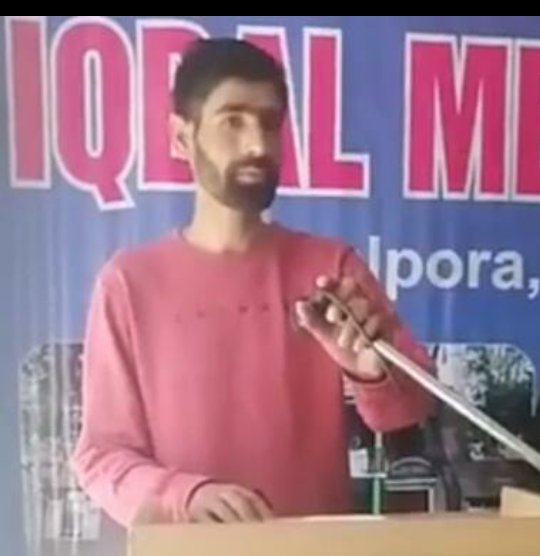Lal Ded |Class 7|Questions & Answers|Tulip Series|Chapter 2|Summary|brightnotes1|
INTRODUCTION
This chapter throws light on the life of a famous 14th century saint-poetess whose name was Lal Ded.
SUMMARY
Lal Ded was the leading poetess of 14th century. She was born in 1320 and died in 1392. She was born in Padmanpor near Pampore, District Pulwama. Lal Ded is known by various appellations like Lalla, Lal Arifa, Lalleshwari, Lal Yogeshwari and Lalla the great.
Lal Ded was the first poet in Kashmiri literature. Her poetry was in the form of poems containing five lines called Vaakhs. These vaakhs describe the relationship between man and God and the deepest urge of human soul, i.e., to be one with the Almighty. In one of her vaakhs, she talks about the temporary nature of this world and advises people not to get overwhelmed by worldly pleasures and charms. Her poetry teaches humanism and is a treasure of wisdom, love, truth, peace and eternal joy.
Lal Ded was married at the age of 12, but her married life proved unhappy because of the ill treatment of her in-laws. Lal Ded left her in-laws when she was 24 years old and took to Sanyas (renunciation). She is a towering personality in the history of Kashmiri literature. She has become a household name as a symbol of patience. She greatly influenced Sheikh Noor-u-Din Wali (RA), the famous Kashmiri poet and saint, known for his great poetry.
Her vaakhs have been translated into English by Richard Temple, Jayalal Kaul, Coleman Barks, Jaishree Odin and Neeraja Mattoo.
working with the text:
1.what are the titles given to lal ded?
Answer:- Lal Ded is known by various appellations (titles) like Lalla, Lal Arifa, Lalleshwari, Lal Yogeshwari and Lalla the great.
Or
Lalla, Lal Arifa, Lalleshwari ,Lalla Yogishwari/Yogeshwari , Lalishriand and Laleed are the titles given to Lal Ded
2.why did she leave her in-laws?
Answer:– Lal Ded at the age of twenty-four(24) left her in-laws and took Sanyas (renunciation) because her married life proved unhappy due to the ill-treatment of her in-laws.
3.where did she go and what did she do?
Answer:- Lal Ded took Sanyas (renunciation) and went to Shaivite and Sufi School. She gave up worldly pursuits and pleasures to know God.
4. what is the vaakh?
Answer:– A Vaakh is a saying or speech of a mystic poetry of Lal Ded popularly known as Lal Vaakh. A collection of Vaakhs in the form of poem is called mystic poetry. Lal Ded created the mystic poetry.
5.what are the features of lal ded’s poetry?
Answer:- Lal Ded’s poetry consists of four line structured theme called Vaakhs. Her Vaakhs represent the best teaching for mankind. They inspire to seek unity and harmony among the people of all races and regions. Her poetry is the emblem of humanism and a treasure of the wisdom, love and truth.
6.who came under her influence?
Answer:- Sheikh Noor-ud-Din Wali (R.A), the famous Kashmiri Sufi saint came under her influence.
7.who translated her poetry into english?
Answer:– Lal Ded’s poetry have been translated into English by Richard Temple, Jaylal Kaul, Coleman Barks, Jaishree Odin, Neerja Mattoo and Ranjit Hoskote.
language work:
match the following to form compound words. write the new words in the space provided.
Answer:-
1. Omni + Present = Omnipresent
2. What + Ever = Whatever
3. Every + Where = Everywhere
4. Your + Self = Yourself
5. Under + Neath = Underneath
grammar work:
a. add suffixes to the words in the brackets and fill in the blanks with the new words.
1. Polythene is a silent (kill) killer for the human race.
2. Smoking is (danger) dangerous to health.
3. It is very (dread) dreadful to use polythene.
4. The cat is (love) lovely pet.
5. Pahalgam has a good (scene) scenic beauty.
6. Some people spend a very (joy) joyous life.
7. Junaid is a very (admire) admirable guy.
8. Polythene is (slow) slowly destroying the earth.
9. That was a (wonder) wonderful scene.
10. There are many (rhyme) rhyming words in the poem.
b. add prefixes to the words in the brackets and fill in the blanks with the new words.
1. I am happy and I enjoy (joy) life.
2. Rashid can read and write. He is not an illiterate (literate) person.
3. Can we control polythene? Yes, nothing is impossible (possible).
4. Aabid is never irregular (regular).
5. Two and two make five. This is incorrect (correct).
6. Keep your luggage aside (side) and sit down.
7. We should exchange (change) our views with each other.




If you have any doubt please let me know